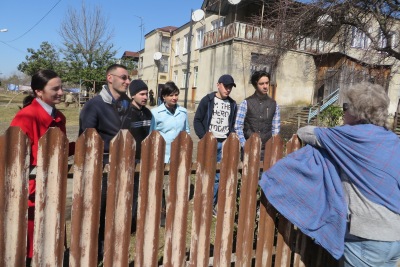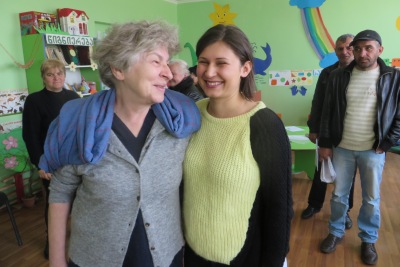Communities mobilizing for increased livelihoods
Date:
In Ingiri, close to the city of Zugdidi, lies one of the Community Resource Centres that has been established with the support of UN Women’s partner organization, TASO Foundation, as part of a project funded by the European Union.

Some of the meeting participants conferring outside the kindergarten in Ingiri, where the CRC has been allocated an office space; Photo: UN Women
The CRCs contribute to the outreach and engagement of IDPs to take part in the project “Equal Access of IDPs to Economic Opportunities”, implemented by the Food and Agriculture Organization of the United Nations (FAO) in partnership with UN Women and funded by the European Union. By promoting access to livelihood opportunities, the project aims to achieve economic empowerment of the most vulnerable groups of IDPs in Georgia. It is expected that by the end of 2017, at least 700 vulnerable IDP families will have received co-investments for implementing livelihood projects. The CRCs, in addition to activities centered around learning and community strengthening, encourage and support vulnerable IDPs to apply for co-investments for their livelihoods or social infrastructure projects.
During a monitoring meeting with TASO Foundation and UN Women, approximately 25 people from Ingiri and five neighbouring villages gathered to discuss potential projects. Three adolescent boys shared their idea to start a similar Community Resource Centre in their community, inspired by Ingiri’s example; one woman expressed her wish to establish a bakery; and a participant from a third village explained community members’ dream of starting a livestock cooperative. However, challenges have also been encountered in producing the documentation required to apply for co-investment support as many IDPs in the Samegrelo region lack official access to land; there have also been challenges in accessing certain necessary certificates free of charge. “You have to be rich to be vulnerable,” notes one of the meeting participants, whose feedback will be followed up on by project partners.

Marina Tabukashvili, Director of TASO Foundation, together with a TASO Community Worker from Orsantia; Photo: UN Women
A similar CRC has also been established in the western village of Martvili. Apart from supporting livelihood ideas and projects, the CRC organizes a wide range of activities that promote social inclusion and a culture of cooperation in the community. These include book readings and discussions, help for children with difficulties in school, computer classes, concerts, joint cleaning of outdoor spaces, documentary screenings and facilitated discussions around gender equality. In the past months, the five CRCs have organized more than 100 activities engaging 540 individuals, many of whom participate on a regular basis.
The Center in Martvili regularly liaises with local authorities, and volunteers note that as a result, these officials have become more responsive to the needs of the community. Activities are for all community members - IDPs and non-IDPs - and one of the participants proudly notes: “This part of the village has become much more alive since we started the Community Resource Center.”